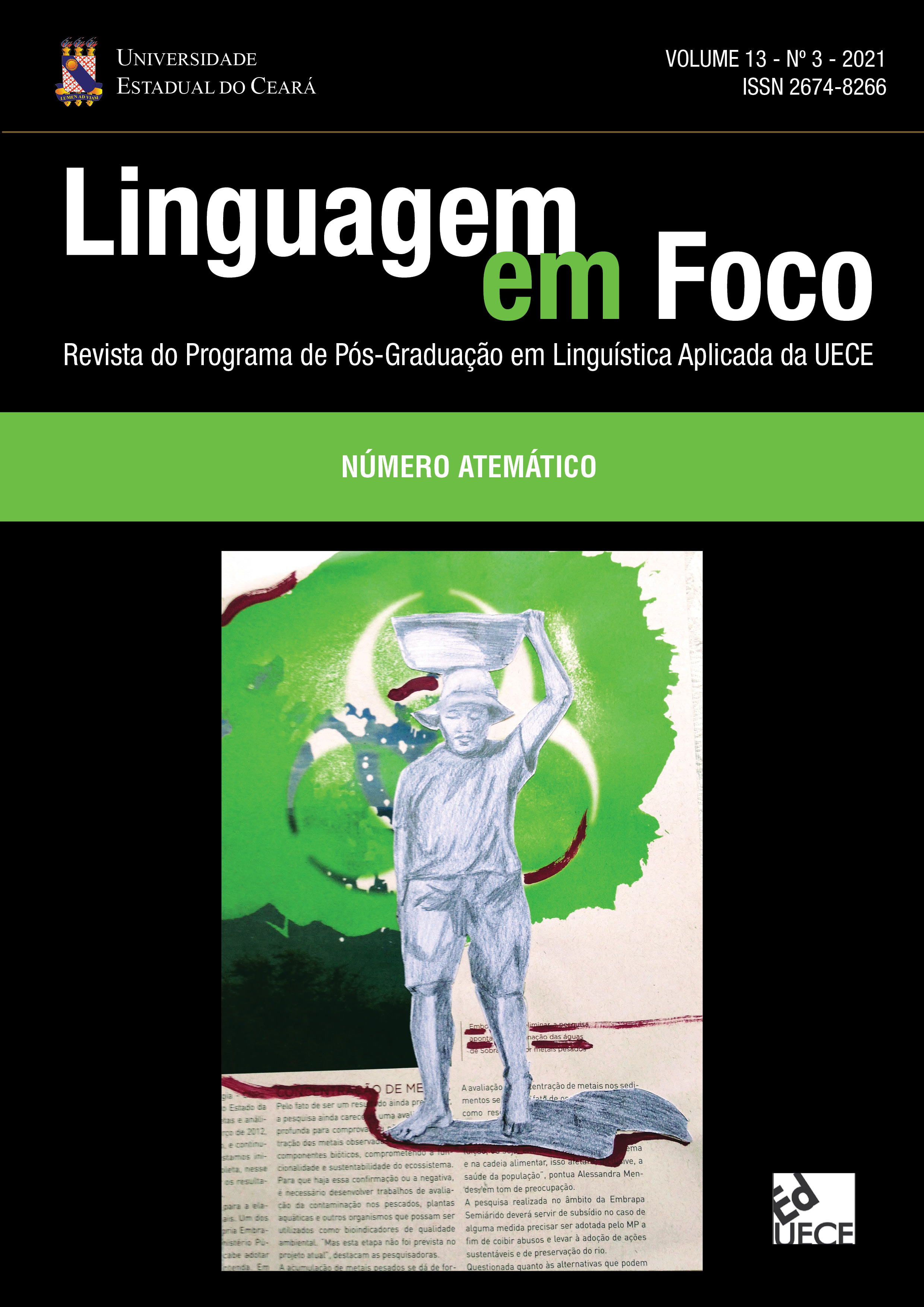English language teaching knowledge processes and learning by design in remote classes
DOI:
https://doi.org/10.46230/2674-8266-13-4519Keywords:
English language teaching, Flipped classroom, Knowledge processes, Emergency Remote Teaching.Abstract
Emergency Remote Teaching-ERE, a teaching model used by innumerous educational institutions during the pandemic context caused by COVID-19, redefined the role of teachers and students and consequently brought new demands on education professionals. This model has also been adopted by us in a language school in the interior of the state of Paraíba, in which the two activities to be presented in this article were carried out, which aims to identify knowledge processes produced by students in two beginners classes, using tools in remote classes and the teacher’s role in the context discussed in this paper. The discussions are based on the contributions of the Pedagogy of the Multiliteracies conceived by the New London Group (1996), on the knowledge construction processes of Kalantzis and Cope (2005, 2008) as well as on the flipped classroom conception originated with Bergmann and Sams (2016), among others. The results show that the knowledge processes were manifested in different ways in the two activities performed which enabled the identification of traits of students' protagonism. We also found that knowledge can be built and shared anywhere and by different agents.
Downloads
References
BERGMANN, J; SAMS, A. Sala de aula invertida: uma metodologia de aprendizagem. Tradução Afonso Celso Cunha Serra. Rio de Janeiro: LTC, 2016.
BORTONI-RICARDO, S. M. O professor pesquisador: introdução à pesquisa qualitativa. São Paulo: Parábola Editorial, 2008.
BUZATO, M. Letramentos digitais e formação de professores. In: CONGRESSO IBERO-AMERICANO EDUCAREDE: EDUCAÇÃO, INTERNET E OPORTUNIDADES, 3, 2006, São Paulo. Anais... São Paulo: CENPEC, 2006. p. 1-13.
COPE, B.; KALANTZIS, M. “Multiliteracies”: New Literacies, New Learning. Pedagogies: An International Journal, 4:3, p. 164-195, 2009. Disponível em: https://www.researchgate.net/publication/242352947. Acesso em: 02 jul. 2020.
COPE, B.; KALANTZIS. M. The things you do to know: an introduction to the pedagogy of multiliteracies. In: COPE, B.; KALANTIZS, M. (ed.). A pedagogy of multiliteracies: learning by design. Palgrave MacMillan, 2015.
GIBBONS, T. Accuracy and Fluency: What’s The Big Deal? The tefl academy. 2017. Disponível em: https://www.theteflacademy.com/blog/2017/06/accuracy-vs-fluency-whats-the-big-deal/. Acesso em: 03 jul. 2020.
HODGES, C. et.al. The difference between emergency remote teaching and online learning. Educause. Disponível em: https://er.educause.edu/articles/2020/3/the-difference-between-emergency-remote-teaching-and-online-learning?fbclid=IwAR0XEHmXYBshCC4qcF5CVsDLWa6y1TKBp9L7reaZ7xjYaCP91fj3xabpspg#fn1. Acesso em: 17 jun. 2020.
KALANTZIS. M; COPE, B. Learning by design. Melbourne: VSIC, Common Ground Publishing Pty Ltda., 2005.
KALANTZIS. M; COPE, B. Knowledge and learning. In: KALANTZIS. Mary; COPE, Bill. New Learning: elements of a Science of education. New York: Cambridge Universtity Press 2008.
KALANTZIS, M.; COPE, B.; PINHEIRO, P. Letramentos. Campinas: Editora da Unicamp, 2020.
KUMARAVADIVELU, B. (Re)visioning language teacher education. In: KUMARAVADIVELU, B. Language Teacher Education for a global society: a modular model for knowing, analyzing, recognizing, doing and seeing. New York and London: Routledge, 2013.
MARCUSCHI, L. A. Análise da conversação. 5. ed. São Paulo: Editora Ática, 2000.
MOITA LOPES, L. P. da. Pesquisa interpretativista em linguística aplicada: a linguagem como condição e solução. D.E.L.T.A., v. 10, n. 2, p. 329-338, 1994. Disponível em: https://revistas.pucsp.br/index.php/delta/article/view/45412. Acesso em: 17 jun. 2020.
MOREIRA, H, CALEFFE, L. G. Metodologia da pesquisa para o professor pesquisador. 2. ed. Rio de Janeiro: Lamparina, 2008.
NEW LONDON GROUP (NLG). A pedagogy of multiliteracies: designing social futures. In: Harvard Educational Review, v. 66, n, 1, Spring, 1996. p. 60-92.
PAIVA, V.L.M.O. Autonomia e complexidade: uma análise de narrativas de aprendizagem. In: FREIRE, M.M; ABRAHÃO, M.H.V; BARCELOS, A.M.F (org.). Linguística Aplicada e Contemporaneidade. Campinas e São Paulo: Pontes e ALAB, p. 135-153, 2005. Disponível em: http://www.veramenezes.com/autocomplex.htm. Acesso em: 04 jul. 2020.
SILVA, C. 10 tips and ideas for using flipped classroom in the ELT classroom. 2015 on-line. Disponível em: https://www.myetpedia.com/10-tips-and-ideas-for-using-the-flipped-classroom-in-the-elt-classroom. Acesso em: 10 dez. 2020.
THIOLLENT, M. Metodologia da pesquisa-ação. 18. ed. São Paulo: Cortez, 2011.
Published
How to Cite
Issue
Section
License
Copyright (c) 2021 Dilma Prata Conserva, Marco Antônio Margarido Costa

This work is licensed under a Creative Commons Attribution 4.0 International License.
Authors who publish in Linguagem em Foco Scientific Journal agree to the following terms:
- Authors retain the copyright and grant the journal the right of first publication. The articles are simultaneously licensed under the Creative Commons Attribution License which allows sharing the work with an acknowledgement of its authorship and initial publication in this journal.
- The concepts issued in signed articles are the absolute and exclusive responsibility of their authors. Therefore, we request a Statement of Copyright, which must be submitted with the manuscript as a Supplementary Document.
- Authors are authorized to make the version of the text published in Linguagem em Foco Scientific Journal available in institutional repositories or other academic work distribution platforms (ex. ResearchGate, Academia.edu).





























